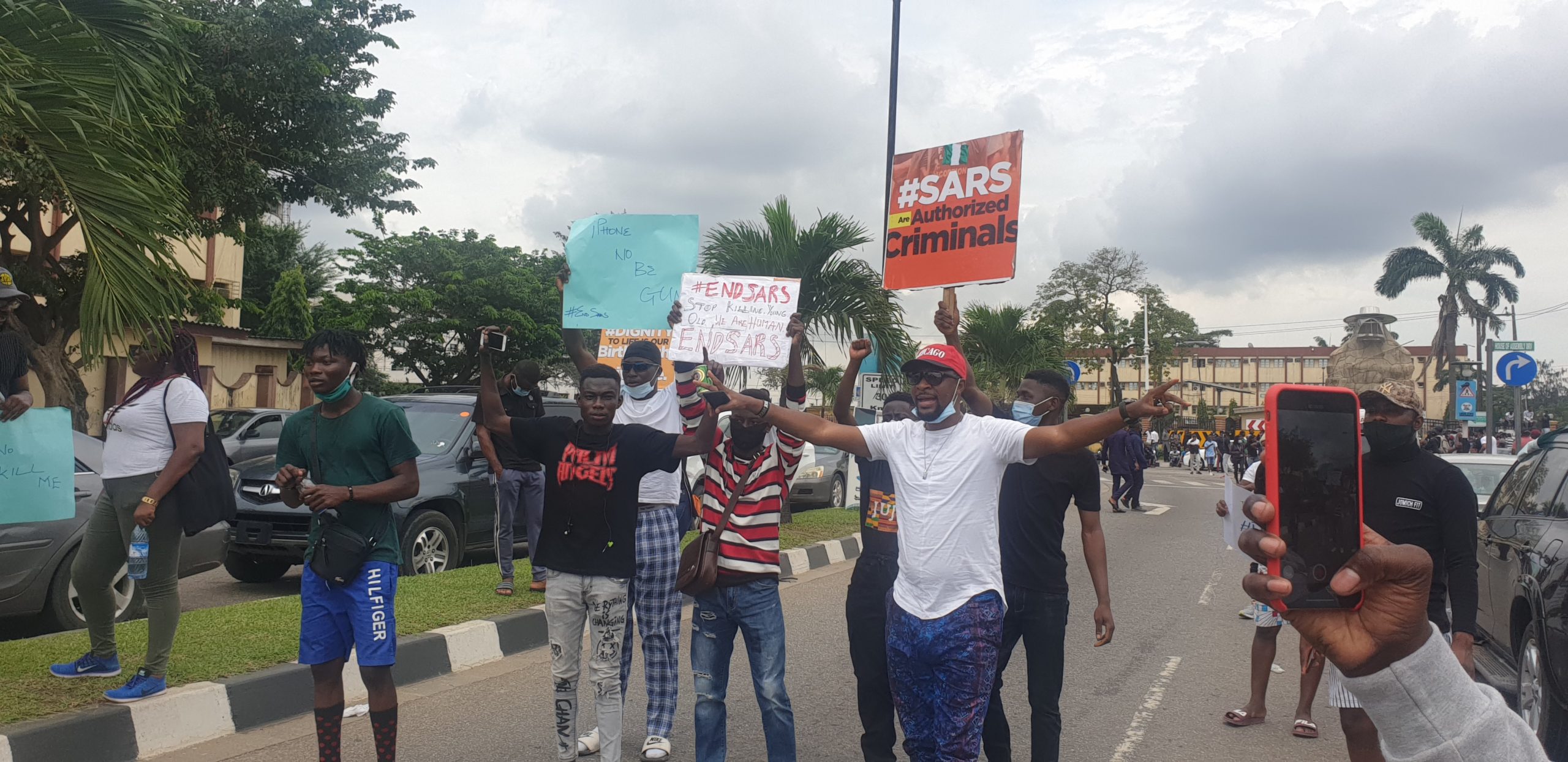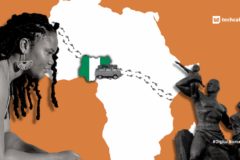Every week, Digital Nomads talks to Africans who have left their home countries to live and work in some other countries. In the year since this column started, we’ve covered a lot of countries.
Afghanistan, Thailand, Kenya, Equatorial Guinea, Iraq, Somaliland, Saudi Arabia…it’s a pretty long list.
This week, we’re doing things a little differently to draw focus to the wave of protests happening in Nigeria. For one week, Nigerians have taken to the streets to ask for the end to a notorious unit of the police; the Special Anti-Robbery Squad (SARS).
Like I said in this article, SARS is so notorious and police brutality is so casual that almost every Nigerian has had a run in with the police.
So this week, I decided to talk to people who left Nigeria mainly because of encounters with SARS or the police. I got lucky, minutes after putting my request on social media, Anu, a lawyer who lives in Cambridge was happy to share her experience.
Anu was born in Lagos, Nigeria and lived in the country until an incident with the police in 2010.
However, before that incident, she had done some traveling.
“I had been traveling to the U.K and back since 2006,” she tells me, mainly because she has family in both countries.
“I liked living in Nigeria but ultimately, my police encounter was the straw that influenced my decision to leave.”
On boxing day in 2010, she and a couple of friends went to a Christmas party in Lagos.
“Another friend offered to drop us off after the party. When we got to Egbeda, we were stopped by Policemen who asked to see a licence and registration. Even after we showed them all the registration papers, they asked to see another document that no one had heard of, so an argument ensued.”
The argument was about the legality of the stop and search. She says she also wanted to know why they were insisting on seeing a document that they were sure didn’t exist.
“It became a heated argument and then a policeman there said he was going to shoot me. Eventually we got to the police station and thankfully, the Divisional Police Officer (DPO) was able to control the situation.”
Anu says it was the first time she realised that she could have died at the hands of the police over an argument.
“I was twenty minutes from my house. To know that I could have been shot when I was minutes from the house was scary.”
It is the sobering reality many Nigerians who have interacted with the police can recognise.
Yet, in 2011, Anu says there was another encounter with the Nigerian police.
“We went to a friend’s birthday at the club in Ikeja. It’s around the Sheraton link bridge. It wasn’t an area we went often so we didn’t know that there was a police stop along the way.”
“While we were trying to park, a police van crossed us and blocked us in.”
It quickly went downhill from there, with the policemen shouting at them and accusing them of being sex workers.
“This was despite the fact that they could easily tell that we were young university students.”
They were taken to a police station on Mobolaji Bank Anthony way and had started harassing them to write statements saying they were sex workers. In the end, they were able to negotiate bribes of ₦20,000 per head before they were released.
“On our way back home, a different set of policemen stopped us again and we immediately started to protest that we had just been released.”
“I knew then that I couldn’t do this anymore. One friend who was also with us on that night left Nigeria for the U.S shortly after that incident. I was about 19 years old at the time and all of this had happened.”
A new police experience
“You would hardly see any police officers on the road here. You may see one or two police officers on foot patrol in high risk areas.”
What was Anu’s first experience with the police in the U.K and how different was it from Nigeria?
“My first incidence with the police here was when a friend got assaulted by her partner. The response from the police was swift. She had made the call from the phone booth and they were there in five minutes.”
Anu says they surrounded the house and made an arrest. In all of this, she says the policemen did not have guns; they only carried tasers and batons.
Thanks to laws that prescribe the use of reasonable force during arrests, policemen are often careful with the use of force. Excessive force during an arrest could make that arrest unlawful.
“In my second incident with the police, a store owner had called the police on us and when the police came, they were really polite. There was no rough handling and they brought their own computer so they could check our details and address. Not once did they check our phones and everything happened away from the crowd at the store.”
“Even though the store owner was being difficult, the police handled the situation well and let us go because we hadn’t done anything wrong. If that was Nigeria, we would have ended up at a police station.”
As our conversation continues, one thing is clear: in Nigeria, it is normal to have police trouble. It is a day to day experience. In the U.K, you can go years without interacting with the police.
One of the reasons this happens is that the police don’t dabble in civil cases.
How are policing outcomes so different?
“When I was at the University, I loaned a friend my laptop and when he eventually returned it, the screen of the laptop was broken.”
“The situation got messy so I called the police. They asked a series of questions to determine if the person stole the laptop or if I willingly gave it to them. After I had answered, they told me that the case was a civil case and that the police couldn’t get involved.”
In hindsight, Anu says she called the police because that’s the sort of thing you do if you’re in Nigeria. The police force in Nigeria is routinely used to settle civil disputes.
It is not unusual to hear people using policemen to arrest their debtors despite the fact that Nigeria has a small claims court.
“When I was still at the University of Lagos, someone I shared a room with had five of us arrested and taken to the Criminal Investigative Division in Panti over a stolen laptop.”
“Before any facts of the matter were established, the police arrested us. In fact, my roommate’s father was telling the policemen at the station to torture us to get us to confess.”
“All the policemen at the station had assault rifles. That kind of situation can never happen here.”
Unlike Nigeria, only three UK forces routinely arm officers – the Ministry of Defence Police, the Civil Nuclear Constabulary who guard civil nuclear facilities, and the Police Service of Northern Ireland.
Solving some of Nigeria’s policing problems using technology
“I think that the first step for better policing in Nigeria is community policing. Here, if you sign up to work for the police, you will work for the police in your local area. I can’t leave the Cambridgeshire police to work with the Derby police.”
One of the arguments for community policing is that because the policemen are native to the area, it makes for more responsible policing. If you’re policing your community, it feels a lot more like actual police work.
Another quick fix for Nigeria is to have a central police database. Right now, one common problem is that when an arrest happens, it is difficult to know where the person is being held.
“With a central database, you know the officers at every station. You also know who made what arrest and who you hold responsible if someone who’s arrested goes missing.”
“A central database is useful for many other things. If officers go out on patrol and we have those records, we know the officers responsible if things go wrong in that area.”
This is even more important in this week where some protesters across Nigeria were arrested and lawyers had a hard time figuring out which police station they were being held. In the Nigerian Police, records do not exist.
“It is why checking for someone’s police records in Nigeria is such a funny process that requires you to pay money. Here, it is free and you have access to that information.”
A central database would also mean that police officers need to be computer literate. Would that require retraining for police officers?
Anu answers that question with one of her own.
“If these police officers are tech savvy enough to go through people’s phones and computers, then they can handle the requirements of maintaining a digital database as well.”





















